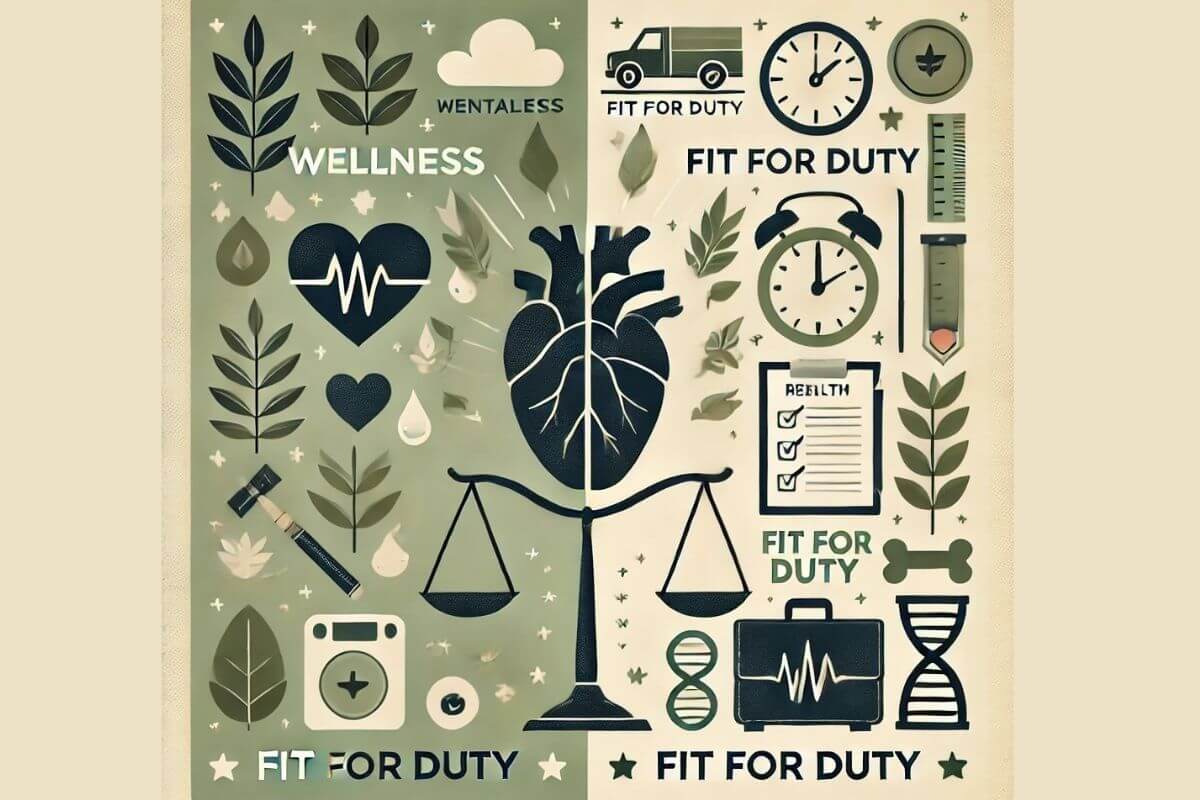What is the Difference between Wellness And Fit for Duty? Wellness refers to overall health and well-being, while Fit for Duty assesses an individual’s ability to perform job tasks. Both concepts are essential but serve different purposes.
Wellness encompasses physical, mental, and emotional health. It promotes a balanced lifestyle, including proper nutrition, exercise, and stress management. Achieving wellness can lead to increased energy, improved mood, and reduced illness. On the other hand, being Fit for Duty focuses specifically on an individual’s readiness to perform their job safely and effectively.
This evaluation considers physical capabilities and mental alertness required for specific tasks. Companies often conduct Fit for Duty assessments to ensure employee safety and productivity. Understanding the distinction helps in creating targeted programs for employee health and workplace efficiency.

Credit: www.amazon.com
Defining Wellness
Wellness is a holistic concept that includes physical, mental, and emotional health. It is more than just the absence of illness. Wellness is about living life to the fullest and making healthy choices. It involves maintaining a balanced lifestyle that promotes overall well-being.
Physical Wellness
Physical wellness involves taking care of your body. This includes regular exercise, a balanced diet, and enough sleep. Physical wellness also means avoiding harmful behaviors like smoking or excessive drinking. Being physically well boosts energy and reduces the risk of disease.
Mental Wellness
Mental wellness focuses on the mind. It is about maintaining a healthy mental state. This includes managing stress, staying positive, and keeping your mind active. Mental wellness also involves seeking help when dealing with mental health issues. A healthy mind contributes to overall well-being.
Emotional Wellness
Emotional wellness is about understanding and managing your feelings. It involves recognizing your emotions and expressing them in a healthy way. Emotional wellness also means developing good relationships and having a support system. It helps you cope with life’s challenges and boosts your happiness.
| Type of Wellness | Key Aspects |
|---|---|
| Physical Wellness | Exercise, diet, sleep, avoiding harmful behaviors |
| Mental Wellness | Stress management, positivity, mental activity, seeking help |
| Emotional Wellness | Understanding emotions, healthy expression, relationships, support system |
Wellness is a continuous journey. It requires conscious effort and commitment. Each type of wellness is important for a balanced life. By focusing on physical, mental, and emotional wellness, you can enhance your overall well-being.

Credit: www.firehouse.com
Understanding Fit For Duty
Understanding Fit for Duty is crucial for workplace safety and productivity. This concept ensures employees can perform their job tasks safely and effectively. Various factors contribute to determining if an individual is fit for duty.
Physical Requirements
Physical requirements are essential for certain jobs. Employees must meet specific health and fitness standards. These standards ensure they can perform physical tasks without risk. For instance, a firefighter must have good cardiovascular health and strength.
| Job Role | Physical Requirement |
|---|---|
| Firefighter | Cardiovascular health, strength |
| Construction Worker | Endurance, agility |
| Office Worker | Basic mobility, ergonomic awareness |
Mental Competence
Mental competence is equally important. Employees must handle stress, make decisions, and solve problems. This ensures they can perform their duties efficiently. For example, a pilot needs sharp mental focus and decision-making skills.
- Handle stress
- Make decisions
- Solve problems
Workplace Safety
Workplace safety is a primary concern. Ensuring employees are fit for duty prevents accidents and injuries. Regular assessments help identify any risks. This keeps the work environment safe for everyone.
- Prevent accidents
- Reduce injuries
- Maintain a safe environment
Key Differences
Understanding the difference between Wellness and Fit for Duty is crucial. Both concepts play significant roles in the workplace, but their scope, assessment methods, and legal implications differ. Let’s delve into these key differences to provide a clear understanding.
Scope And Focus
The scope and focus of wellness and fit for duty differ greatly.
- Wellness: Focuses on overall health and well-being.
- Fit for Duty: Ensures employees are physically and mentally capable of performing their job tasks.
Wellness programs aim to improve health, reduce stress, and promote a balanced life. Fit for duty assessments determine if an employee can safely perform work duties.
Assessment Methods
Assessment methods for wellness and fit for duty are distinct.
| Aspect | Wellness | Fit for Duty |
|---|---|---|
| Method | Health surveys, biometric screenings, lifestyle assessments | Physical exams, psychological evaluations, drug testing |
| Frequency | Ongoing | Pre-employment, periodic, post-incident |
Wellness assessments are usually ongoing and voluntary. Fit for duty assessments are more formal and often mandatory.
Legal Implications
The legal implications of wellness and fit for duty also differ.
- Wellness: Usually voluntary and subject to privacy laws.
- Fit for Duty: Can be mandatory, with legal requirements for safety and compliance.
Wellness programs must comply with health privacy laws like HIPAA. Fit for duty assessments must align with labor laws and safety regulations.
Understanding these differences helps create effective workplace health programs. Both wellness and fit for duty are essential for a healthy, safe, and productive work environment.
Importance In The Workplace
Understanding the difference between wellness and fit for duty is vital in the workplace. Both concepts aim to support employee health and safety. However, they serve different purposes. This section explores their importance in the workplace.
Employee Health
Wellness programs aim to improve overall employee health. These programs include activities like fitness classes, nutritional guidance, and mental health support. They help employees maintain a healthy lifestyle.
Fit for duty assessments, on the other hand, focus on an employee’s ability to perform their job. These assessments ensure employees are physically and mentally able to complete their tasks. This is crucial for roles with high physical demands or safety risks.
Productivity
A strong wellness program can boost employee productivity. Healthy employees are more energetic and focused. They take fewer sick days and contribute more effectively to the company.
Fit for duty evaluations ensure that employees are ready for work. This leads to fewer accidents and interruptions. The workplace runs smoothly, and productivity remains high.
Risk Management
Wellness programs help in reducing long-term health risks. They promote preventive care and healthy habits. This can lower medical costs for both employees and employers.
Fit for duty assessments are critical for risk management. They prevent unfit employees from performing tasks that could endanger themselves or others. This is especially important in industries like construction or healthcare.
Here’s a quick comparison in table format:
| Aspect | Wellness | Fit for Duty |
|---|---|---|
| Focus | Overall health | Job-specific capability |
| Activities | Fitness, nutrition, mental health | Physical and mental assessments |
| Benefits | Improved energy, fewer sick days | Reduced accidents, higher safety |
How To Assess Wellness
Assessing wellness is vital for a healthy lifestyle. Knowing your wellness status helps you make informed decisions. This section explores methods to assess wellness effectively.
Self-assessment Tools
Self-assessment tools can help you understand your wellness better. These tools include:
- Journals: Track your mood, diet, and sleep patterns daily.
- Apps: Use wellness apps for tracking fitness and diet.
- Surveys: Complete online wellness surveys for insights.
Professional Evaluations
Professional evaluations provide a deeper understanding of your wellness. Consider these options:
- Medical Check-Ups: Visit your doctor for a comprehensive health check.
- Therapists: Consult a therapist to assess your mental health.
- Nutritional Experts: Seek advice from nutritionists for diet plans.
Regular Check-ups
Regular check-ups are crucial for long-term wellness. Schedule these regularly:
- Annual Physical Exams: Get a yearly physical exam.
- Blood Tests: Check your blood levels twice a year.
- Dental Visits: Visit the dentist every six months.
Assessing wellness involves self-assessment tools, professional evaluations, and regular check-ups. These methods ensure you stay healthy and informed.
How To Assess Fit For Duty
Understanding how to assess Fit for Duty is crucial for any organization. It ensures employees can perform their jobs safely and effectively. This process involves multiple evaluations to ensure overall fitness. Let’s explore these methods.
Medical Examinations
Medical examinations are essential in assessing fit for duty. These exams check the physical health of employees. Doctors look for signs of illness or injury. Regular check-ups can prevent workplace accidents.
- Blood pressure measurement
- Vision and hearing tests
- Physical fitness tests
| Test Type | Purpose |
|---|---|
| Blood Pressure | Check heart health |
| Vision Test | Ensure clear sight |
| Hearing Test | Ensure clear hearing |
Performance Tests
Performance tests evaluate if employees can do their job tasks. These tests measure skills and physical ability. They ensure workers can handle job-specific challenges. Examples include:
- Strength tests
- Endurance tests
- Skill-based assessments
Each test targets a specific job function. Passing these tests shows readiness for the role.
Psychological Evaluations
Psychological evaluations check mental and emotional health. These evaluations are crucial for high-stress jobs. They ensure workers can handle pressure and stay focused. Common evaluations include:
- Stress level assessments
- Mental health screenings
- Personality tests
These tests reveal if an employee is mentally prepared. A healthy mind is as important as a healthy body.
Integration Strategies
Understanding the difference between Wellness and Fit for Duty is essential. Integrating both strategies improves employee health and productivity. This section explores effective integration strategies for both concepts.
Wellness Programs
Wellness programs focus on overall employee health. They include activities that improve physical, mental, and emotional well-being. These programs often feature:
- Fitness Challenges
- Health Screenings
- Stress Management Workshops
- Nutrition Counseling
Wellness programs aim to create a healthier work environment. Employees feel more valued and engaged.
Fit For Duty Policies
Fit for Duty policies ensure employees can perform their job safely. These policies often include:
- Regular Health Assessments
- Drug and Alcohol Testing
- Physical Fitness Requirements
- Mental Health Evaluations
Fit for Duty policies protect both employees and the organization. They ensure workplace safety and efficiency.
Combined Approaches
Combining Wellness Programs and Fit for Duty Policies maximizes benefits. This integrated approach can include:
| Strategy | Benefits |
|---|---|
| Regular Health Checks | Identify potential issues early |
| Fitness Incentives | Encourage active lifestyles |
| Mental Health Support | Reduce stress and burnout |
| Comprehensive Training | Improve overall safety and productivity |
This approach leads to healthier, happier, and more productive employees. Companies save on healthcare costs and reduce absenteeism.

Credit: www.amazon.com
Frequently Asked Questions
What Is Wellness?
Wellness refers to overall well-being, including physical, mental, and emotional health. It involves lifestyle choices and habits that promote health and happiness.
What Does Fit For Duty Mean?
Fit for duty means an employee is physically and mentally capable of performing their job tasks safely and effectively.
How Do Wellness And Fit For Duty Differ?
Wellness focuses on overall well-being and health. Fit for duty specifically assesses an employee’s ability to perform job duties.
Why Is Wellness Important?
Wellness is important for maintaining good health, reducing stress, and improving quality of life. It enhances productivity and happiness.
Conclusion
Understanding the difference between wellness and fit for duty is essential. Wellness focuses on overall health and well-being. Fit for duty, on the other hand, evaluates an employee’s ability to perform job tasks. Both are important for a productive and healthy workplace.
Prioritizing both can lead to a more engaged and efficient workforce.

“As the voice behind Radiant Glow Health, we are dedicated to being your ultimate wellness and vitality companion. Our mission is to inspire and guide you on your journey to a healthier and more vibrant life. Join us as we explore holistic health practices and empower you to radiate wellness from within.”



